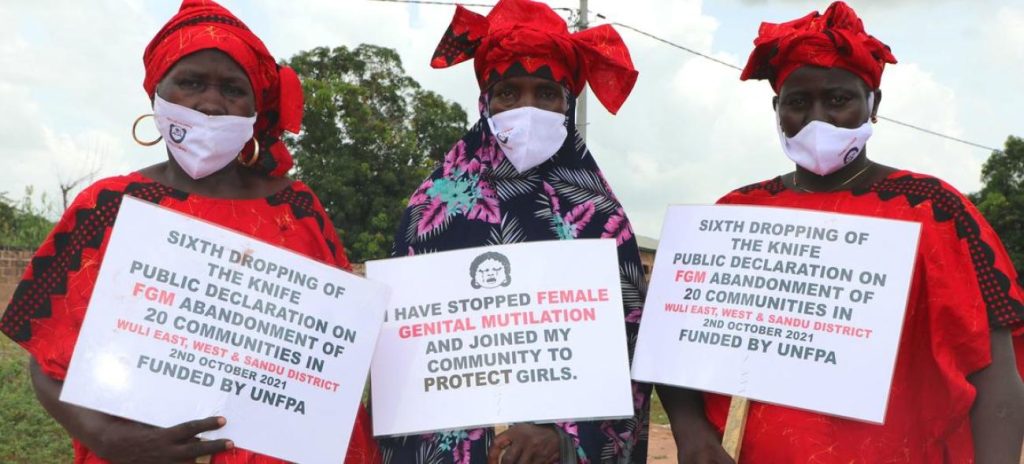By Ndey Ceesay
Children in The Gambia are subject to various forms of protection by law, including protection from harmful traditional practices like Female Genital Mutilation or Cutting (FGM/C) also referred to as female circumcision.
Section 19 of the Children’s Act, 2005, states that “No child shall be subjected to any social and cultural practices that affect the welfare, dignity, normal growth and development of the child and, in particular, those customs and practices that are–
(a) prejudicial to the health and life of the child; and
(b) discriminatory to the child on the grounds of sex or other status
Obligation to Protect
The law also states in Section 9 – Right to health and health services, that “(1) Every child has the right to enjoy the best attainable state of physical and mental health.
Subsection (2) places an obligation on “Every Government, parent, guardian, institution, service, agency, organisation or body responsible for the care of a child shall endeavour to provide for the child the best attainable state of health.”
This means that as the Gambia’s parliamentarians considers a bill to repeal the Women’s (Amendment) Act, 2015 which places a ban on FGM/C, the National Assembly as an institution must respect its obligation under the law to protect children.
The Islamic Council, which supports the idea of lifting the ban on FGM, and every parent or legal guardian of a child in The Gambia, must also respect and uphold their obligations to protect girl children in madrassas (Arabic schools) and homes across the country – from the harmful traditional practice.
The Women’s (Amendment) Act, 2015 places a ban on the practice of FGM/C in The Gambia. Sections 32A and 32B criminalized the practice with punishments of imprisonment of up to 3 years and fines of up to $735.6 for performing, procuring, and aiding and abetting the practice of FGM/C or female circumcision.
International Law
The Gambia is a signatory to the United Nations Convention on the Rights of the Child – an international human rights treaty (legally-binding) which sets out the civil, political, economic, social, health and cultural rights of children regardless of their race, religion or abilities.
The UNCRC, as it is known by acronym, is the most widely ratified human rights treaty in history and has helped transform children’s lives around the world. The Gambia domesticated this law by the enactment of the Children’s Act, 2005.
Despite this progress, the Convention is still not fully implemented – and for the fact that it is legally-binding, it means The Gambia, and all countries that signed up to the UNCRC are bound by international law to ensure it is implemented.
Gender-based Violence
FGM/C or female circumcision is widely considered a form of gender-based violence.
According to the World Health Organization (WHO), violence against women is defined as “any act of gender-based violence that results in, or is likely to result in, physical, sexual, or mental harm or suffering to women, including threats of such acts, coercion or arbitrary deprivation of liberty, whether occurring in public or private life.”

First Conviction
In August 2023, three women were convicted and fined for carrying out Female Genital Mutilation (FGM) on eight infant girls in the Gambia – becoming the first people convicted under a 2015 law that banned the harmful traditional practice.
The girls were between the ages of one and four years old, and the women were fined D15, 000 (a little over $200) each or in default serve a one-year prison sentence.
The verdict, which angered some religious leaders who paid the fines, was hailed as a landmark feat by local and international agencies leading the campaign to eradicate the harmful practice.
Since then, there has been a campaign to lift the ban in a country that is placed among 10 countries with the highest level of FGM in the world, with 78.3% of women aged between 15 and 49 years undergoing FGM/C, according to the latest Gambia Demographic and Health Survey (2019-20 GDHS) published by the Gambia Bureau of Statistics (GBoS).
The “lift the ban campaign” was subsequently escalated to a policy level with a Draft Women’s (Amendment) Bill, 2024 sponsored by the National Assembly member for Foni Kansala – which seeks to make the practice of FGM/C a “matter of choice” for those who want to practice it.
Activists opposed to the practice say repealing the law will make Gambia unsafe for women. The proponents, including Muslim leaders, say the practice is sanctioned by Islam – which activists and other muslim leaders within and outside the Gambia have disputed.
Read More on FGM/C:


